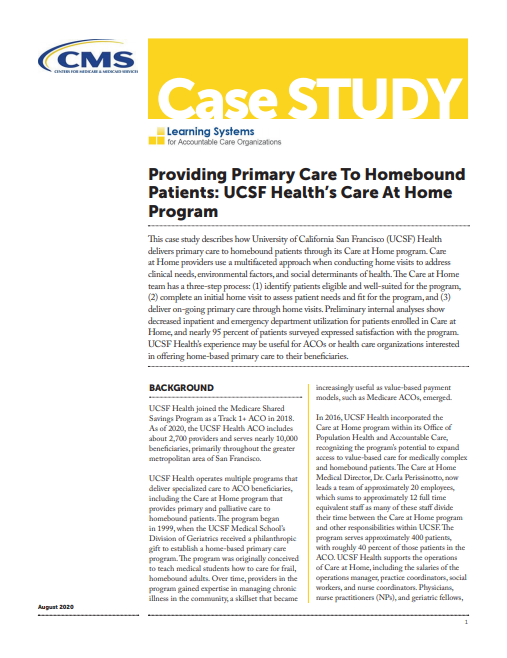Headline
This case study highlights an accountable care organization’s (ACO) home-based primary care program (HBPC) for homebound older adults, with early internal analyses showing reduced acute care utilization and high patient satisfaction.
Context
The University of California San Francisco (UCSF) Health ACO serves nearly 10,000 individuals. UCSF’s HBPC program for homebound patients, known as Care at Home, was incorporated into UCSF’s Office of Population Health and Accountable Care in 2016 based on the potential for this program to deliver value-based care for adults with complex medical and functional needs. This program is funded by UCSF Health ACO and serves 400 patients, of which approximately 40 percent are in the ACO. An interdisciplinary team of physicians, nurse practitioners, and social workers conduct home visits and deliver ongoing primary care while supporting patients and families with complex care needs.
This case study describes Care at Home program operations and workflow components, including how patients are identified, what takes place during initial home visits, and how ongoing primary care is delivered at home.
Findings
An internal analysis conducted by UCSF that compared enrolled patients with a comparison group found that Care at Home patients experienced around 70 percent fewer inpatient admissions and observation days, with a similar decrease in emergency department visits. Additionally, nearly 95 percent of patients reported satisfaction with the program. Finally, the case study explores lessons learned, including using recent hospitalization data to identify potential patients most interested in HBPC services, communicating effectively with patients about program intent, and recruiting providers who are successfully able to adapt to working in patient home environments.
Takeaways
The experience of UCSF Health’s Care at Home program may help to inform ACOs and other health care organizations delivering value-based care in their work to develop HBPC programs for homebound older adults.


